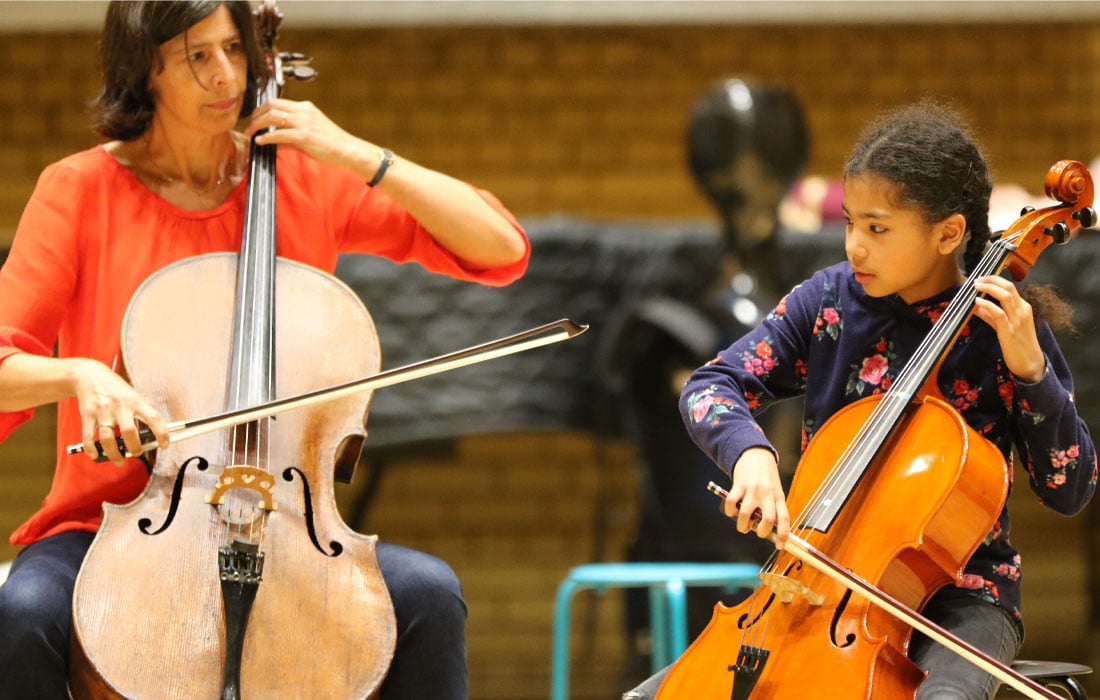
Photo: © Jakob Grubbström
Inspiring tomorrow’s classical composers
Contemporary classical music aligns naturally with children's playful approach to sound, says Nancy Evans.
Most young people have never encountered contemporary classical music, or even classical music (unless they’ve learnt an instrument), in any sustained way. To them, classical and contemporary music inhabit a world of ‘other’ music, different from the popular music, in its various forms, that most of them are listening to daily.
We offer the children the composer’s processes, starting points and thinking as found in the piece and they are encouraged to play at being composers
For many years, alongside my role at Birmingham Contemporary Music Group (BCMG), I had a parallel career as a musician working in early years settings. To many people these two worlds may seem far apart, but for me there was a strong connection between the two. Very young children are fascinated by sounds, and put them together to make repeated patterns and variations. They are playful with sounds, in a way not dissimilar to a composer working in a contemporary classical music idiom. These children understand music as gesture, emotional expression and direct communication.
Playful beginnings
If you start from this understanding of children’s emerging musicality, then creating opportunities for them to compose and listen to contemporary music is a natural progression, and not something to introduce them to after they have mastered or experienced XYZ.
The challenge is to help them to keep their early playfulness, open ears and belief in themselves as music creators as they get older. Frequently this does not happen, due to a lack of opportunities and support from skilled adults. As a consequence, composing activity can be reduced to simple soundscapes or later on, an exercise in notation or pastiche, ignoring how children compose and progress as composers.
I have also noticed that the way young people are being asked to compose in schools is very different from how professional composers actually compose. Of course, children do not have the same aural imagination and technical skills, but there is much they can learn from sharing in a composer’s creative processes.
BCMG’s commissioning and performance of new music by living composers generates an abundance of opportunities for young people to experiment with diverse starting points, composing processes and working practices.
Music Maze is one such BCMG project: a series of day-long, free composing workshops for 8 to 11-year-olds. Each workshop takes a piece of music from a BCMG concert as its inspiration, and to act as a catalyst. We are not asking the young people to create pastiche. Instead, we offer the children the composer’s processes, starting points and thinking as found in the piece, and they are encouraged to play at being composers. This is done in a way that also honours and embraces the musical imagination and experiences of the child.
It is the process and not the end-product that is important and transformational to the young people in these workshops. If the young people come to the subsequent concert, they listen with different ears having experienced the workshop. But more importantly, they come away understanding something different about music, what it is and how it is created. They see that they can be creators too, and that music is as diverse as composers are. They also learn that composers aren’t doing something so very different from themselves, albeit with more sophisticated tools and resources. But the same playfulness is still there, along with the notion of exploring ideas through sound.
Limited resources
To have an impact within the orchestral and music education sector, we have to think carefully about our resources and where to focus them. Our approach is to create models of practice where the voices of composers, musicians, teachers and children can be heard. In recent years, much of this has been done in collaboration with academic researchers at Birmingham City University (BCU).
Listen Imagine Compose is a three-way partnership between ourselves, BCU and Sound and Music. Originally it was an action research project that explored the teaching and learning of composing in secondary schools, but now the findings form the basis of a Masters in Teaching and Learning and other informal teacher training.
Meet the composer
We have a long history of commissioning new music, and this is something we extend to our learning programme. Most children learning an instrument are very unlikely to have met the composer. And so composers remain remote figures, not people engaged in live active music-making with performers, engaging with and commenting on the world around them.
Many of our commissions for young people have included extended techniques, aleatory/improvised parts and graphic notation. Some of this can seem weird, funny and strange to the young people, but if there is an effective process through which the composer gets to know and works with them, they can grow a real sense of ownership of the music and embrace its challenges.
If we want to engage young people in contemporary music, this means connecting their worlds with those of living composers. It's about creating the right contexts for this to happen, alongside recognising and creating a space for children’s own creative musicality. Then what seems unfamiliar and strange gains meaning through shared purpose, authentic connection, dialogue and social interaction.
Let’s have a composer in residence in every music education hub, regularly commission new music for young people to perform and create sustainable progressive high-quality opportunities for young people to compose both in and out of school.
Nancy Evans is Director of Learning and Participation at Birmingham Contemporary Music Group.
www.bcmg.org.uk
Tw @bcmg
Join the Discussion
You must be logged in to post a comment.